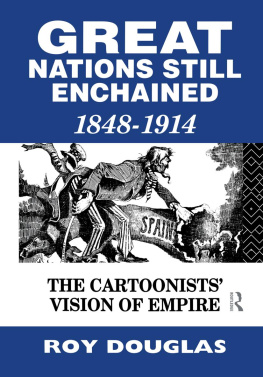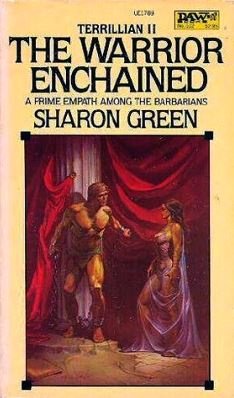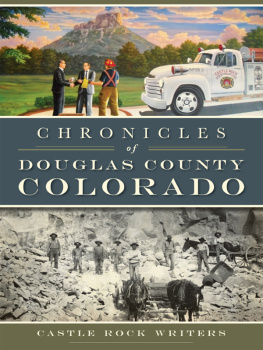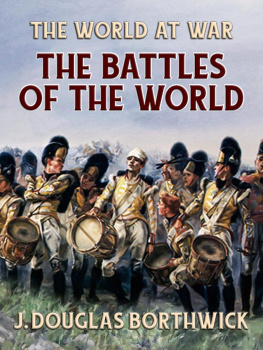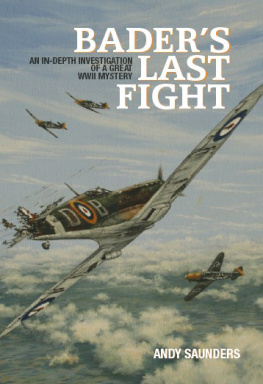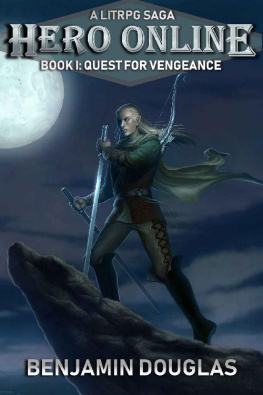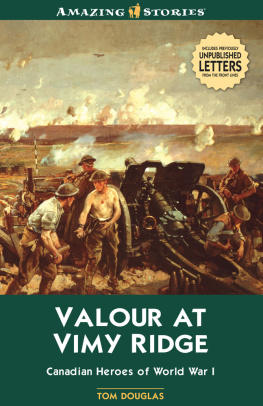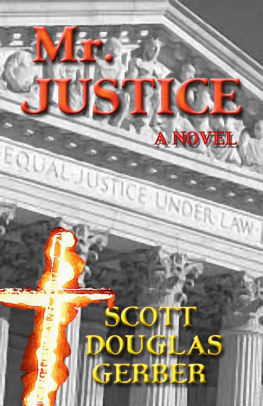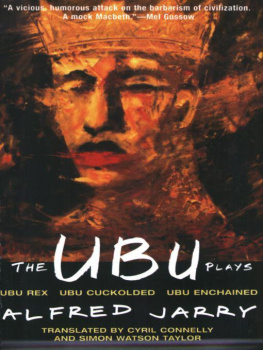'GREAT NATIONS STILL ENCHAINED'
`Great Nations Still Enchained
The Cartoonists Vision of Empire 18481914
Roy Douglas
First published 1993
by Routledge
2 Park Square, Milton Park, Abingdon, Oxon, OX14 4RN
Simultaneously published in the USA and Canada
by Routledge
270 Madison Ave, New York NY 10016
Transferred to Digital Printing 2005
1993 ROY DOUGLAS
Typeset in 10 on 12 point Sabon by
Florencetype Ltd, Kewstoke, Avon
All rights reserved. No part of this book may be reprinted or reproduced or utilized in any form or by any electronic, mechanical, or other means, now known or hereafter invented, including photocopying and recording, or in any information storage or retrieval system, without permission in writing from the publishers.
British Library Cataloguing in Publication Data
A catalogue record for this book is available from the British Library
Library of Congress Cataloging in Publication Data
Douglas, Roy
Great nations still enchained: the cartoonists vision 18481914 /
Roy Douglas.
p. cm.
Includes bibliographical references and index.
1. World politics19th centuryCaricatures and cartoons.
2. World politics19001918Caricatures and cartoons.
3. Great powersHistory19th centuryCaricatures and cartoons.
4. Great powersHistory20th centuryCaricatures and cartoons.
5. Wit and humor, Pictorial. 6. Political cartoonsHistory19th century.
7. Political cartoonsHistory20th century. I. Title.
D389.D68 1993
909.81dc20 9240447
ISBN 0-415-068568
Contents
In this book, cartoons have been used as the principal vehicle for studying events of a very important period in the history of Europe. That period extends from the year 1848, which saw the first general challenge to the political order established after the defeat of Napolon, down to the outbreak of the Great War in 1914. It covers massive events like the unification of Germany and Italy, several important European wars, and the main surge of European colonialism.
By 1914, three of the Great Empires which had appeared impregnable in 1815 began to show many signs of incipient disintegration, while new alliances appeared which would prove of crucial importance when the Great War came. All of these events and processes took place in a manner, and for reasons, which are by no means immediately apparent to the modern reader, and contemporary cartoons cast important light upon them. Some of the events, particularly in the early period, seemed to occur rather in isolation from each other, and it is only in the context of later events that the link becomes apparent.
The period commences not long after satirical cartoons of a modern kind began to reach a wide readership. Publication of Le Charivari started in Paris in 1832; Punch appeared in London a decade later; Kladderadatsch in Berlin in 1848; and there were soon many other periodicals of a similar kind. Later, weekly illustrated publications which were not primarily satirical in character, like Harper's Weekly in New York and L'Illustration in Paris, began to carry cartoons. By the late nineteenth century, some daily newspapers were doing the same. It was only in the early twentieth century, however, that the practice of using cartoons with strong political overtones became general in newspapers, and in some it did not begin until long after the Second World War. As democracy advanced, so did the political cartoon become increasingly widespread. It recorded opinion; but, to a growing extent, it also helped to form opinion.
A good cartoon often contains an astonishing amount of information. It frequently summarises ideas far more clearly and simply than do speeches and written material. It tells the modern reader a great deal about the ideas and assumptions of the people for whom it was drawn: what they took for granted and what they questioned; how they visualised people who held ideas different from their own, or who lived in different countries. Thus it helps us to know what the past was really like.
The cartoonist, in order to be effective, must necessarily communicate in a manner which will excite the reader's sympathy for the message he is trying to put over. It is therefore often possible to understand through cartoons what opposing sides thought about a controversy, and sometimes about other matters as well. We can learn much, for example, about how the readers could be expected to perceive people of other political views or social classes, or from other nations. It is sometimes possible to obtain insights into their attitudes on religious or philosophical questions. Cartoons are vivid, they are often fun, and they bring home facts and ideas in a simple and palatable form. At times they remind us of matters which even historians tend to ignore or forget. Today's hero often becomes tomorrow's villain, and vice versa.
There is often exaggeration and over-simplification in a cartoon; but so also is there often exaggeration and over-simplification in speeches and writings. But a cartoon, unlike a speech or a piece of writing, must be preserved in its entirety if it is preserved at all, and the historian of later times cannot 'censor' it in a manner which preserves some features and excludes others, in order to fit with some convenient hypothesis about the past.
The author wishes to express his grateful thanks to those who have assisted materially in this work. His wife Jean and his son Bruce checked much of the manuscript, and provided many useful suggestions. Professor Bertram Pockney and Mr John Taylor of the University of Surrey, and Mr David Mills, checked the author's translations from Russian, German and French respectively, and provided a number of interesting sidelights which have found their way into the book.
The author also wishes to express gratitude to those who have made the material available, and have permitted him to take illustrations therefrom: notably, the British Library and also its Newspaper Library at Colindale, and the University of Kent at Canterbury, whose important collection of cartoons is becoming increasingly well known. The various cartoons from the periodicals Judy and Fun were all obtained from that source. Special thanks are due to the Russian section at the British Library for .
The date of the material in this book makes it unlikely that many copyrights still subsist for which permission should have been sought; but if there are exceptions, the author and his publishers would invite any copyright holders to inform us of this oversight.
All of these cartoons have been reproduced from contemporary periodicals, or from microfilm copies of those periodicals. The quality of the print was often poor. The author apologises for these imperfections.
1
Midcentury, 184856
European statesmen and diplomats who assembled at the Congress of Vienna after the final defeat of Napolon in 1815 were in agreement about many things. Any kind of universally destructive war like the one in which they had just been engaged must be avoided in the future. Anything, anywhere, which savoured of 'revolution' must be put down. Current disputes, and disputes which might arise in the future, should be settled between the Great Powers, within the ambit of what was coming to be called the 'Concert of Europe'.
In the thirty years which followed, the gloomy view that any substantial change in the political order must lead to universal chaos was largely disproved by events. In France itself, the 'legitimist' King, Charles X, was replaced by a distant kinsman, Louis Philippe. In Britain, constitutional changes deriving from the 1832 Reform Act seemed to bring stability rather than disruption. Belgium broke away from The Netherlands and established a kingdom, which was soon acknowledged by the Powers. Greece seceded from the Ottoman Empire. Most of the Spanish colonies in the Americas became independent republics. If such changes could take place, sometimes peacefully, always without violence or disruption on a scale remotely comparable with events in France a few decades earlier, then there seemed little reason for equating political change with massive bloodshed and universal instability.


